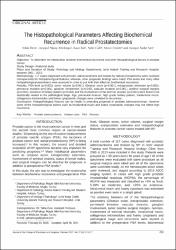The Histopathological Parameters Affecting Biochemical Recurrence in Radical Prostatectomies
Özet
Objective: To determine the relationship between biochemical recurrence and other histopathological factors in prostate cancer. Study Design: Analytical study. Place and Duration of Study: Pathology and Urology Departments, Izmir Ataturk Training and Research Hospital, between 2001 - 2013. Methodology: 117 cases diagnosed with prostatic adenocarcinoma and treated by radical prostatectomy were reviewed retrospectively for histopathological features; whereas, other prognostic findings were noted. PSA levels and many other histopathological parameters were assessed in order to put forth their effect on biochemical recurrence. Results: PSA level (p < 0.001), tumor volume (p < 0.001), Gleason score (p < 0.001), extraprostatic extension (p < 0.001), perineural invasion (p < 0.001), ganglion involvement (p=0.040), vascular invasion (p < 0.001), positive surgical margins (p < 0.001), presence of tertiary pattern (p=0.004) and the involvement of the seminal vesicles (p < 0.001) were found to be statistically related to the pathological stage. Age, perineural invasion, high grade tertiary pattern, intraluminal mucin, collagenous micronodules and foamy cytoplasmic changes were unrelated to recurrence. Conclusion: Histopathological features can be helpful in predicting prognosis in prostatic adenocarcinomas. However some of the histopathological factors such as intraluminal mucin and foamy cytoplasmic changes may not reflect high recurrence.


















